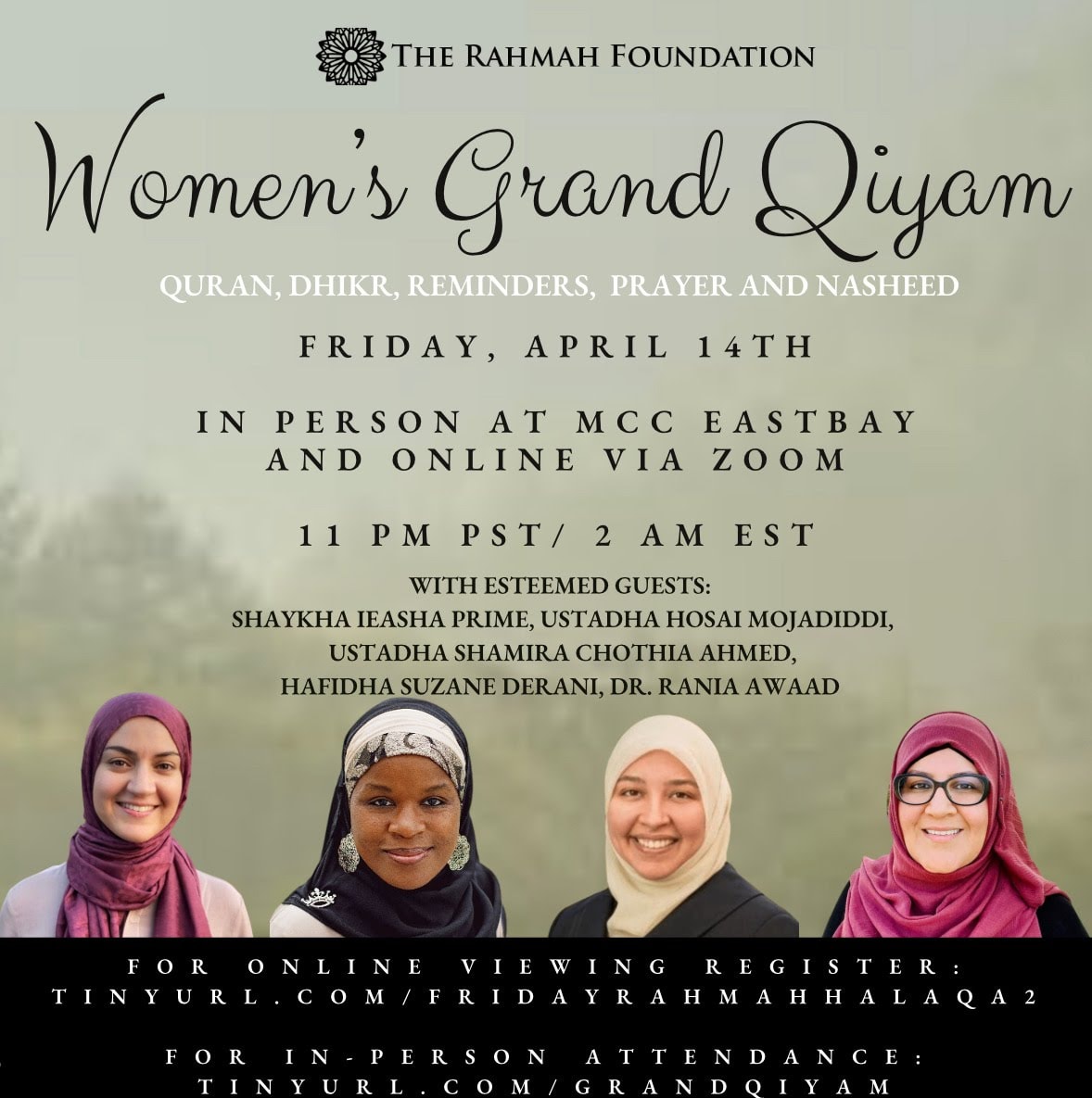Join our esteemed panel of speakers for a night of prayer, remembrance, and reminders starting after Taraweeh prayer (11:15 p.m.).
Post Taraweeh till Suhoor | Saturday, April 15 | Conference Room | Free | Suhoor provided at about 4 a.m. | Register at HTTP://tinyurl.com/grandqiyam
*Friday, March 31 sisters’ Qiyam is virtual only. Please sign up for it here.*
Cosponsored with The Rahmah Foundation. For female teens and women only.
- – More The Rahmah Foundation at the MCC: https://mcceastbay.org/rahmah-foundation
- – More Ustadha Dr. Rania Awaad: https://mcceastbay.org/rania
- – More sessions for Muslim women: https://mcceastbay.org/women
- – More Dr. Rania’s Friday Evening Halaqas: https://mcceastbay.org/womens-halaqa
Qiyam Ul-Layl literally translates to “standing during the night”. And in the Islamic Tradition, the Prophet Muhammad PBUH said, “The best prayer after the obligatory prayers is the night prayer.” (Sahih Muslim)
“When Allah, the Most Merciful, created the woman, He gave her mercy as her nature. He created her for mercy.”
About the Speaker:
Dr. Rania Awaad, M.D. is a Clinical Associate Professor of Psychiatry at the Stanford University School of Medicine where she is the Director of the Muslim Mental Health Lab and Wellness Program and Director of the Diversity Clinic. She pursued her psychiatric residency training at Stanford where she also completed a postdoctoral clinical research fellowship with the National Institute of Mental Health (NIMH). Her research and clinical work are focused on the mental health needs of Muslims. Her courses at Stanford range from teaching a pioneering course on Islamic Psychology, instructing medical students and residents on implicit bias and integrating culture and religion into medical care to teaching undergraduate and graduate students the psychology of xenophobia. Her most recent academic publications include an edited volume on “Islamophobia and Psychiatry” (Springer, 2019), Islamic Psychology (Routledge, 2020) and an upcoming text on Muslim Mental Health. She has also produced a toolkit, fact sheet, CME course, and is now editing a clinical textbook on Muslim mental health for the American Psychiatric Association. Dr. Awaad is particularly passionate about uncovering the historical roots of mental health care in the Islamic intellectual heritage. Through her outreach work at Stanford, she is also the Clinical Director of the San Francisco Bay Area branches of the Khalil Center, a spiritual wellness center pioneering the application of traditional Islamic spiritual healing methods to modern clinical psychology. She has been the recipient of several awards and grants for her work. Prior to studying medicine, she pursued classical Islamic studies in Damascus, Syria and holds certifications (ijaza) in Qur’an, Islamic Law and other branches of the Islamic Sciences. Dr. Awaad has also served as the first female Professor of Islamic Law at Zaytuna College, a Muslim Liberal Arts College in Berkeley, CA where she taught courses on Shafi’i Fiqh and Women’s Fiqh and Qur’anic sciences for nearly a decade. In addition, she serves as the Director of The Rahmah Foundation, a non-profit organization dedicated to educating Muslim women and girls. At Rahmah, she oversees the Murbiyyah spiritual mentoring program for girls. Dr. Awaad is a nationally recognized speaker, award-winning teacher, researcher and author in both the Islamic and medical sciences. Follow her on I/T: Dr.RaniaAwaad
– More from Dr. Rania: https://mcceastbay.org/rania



